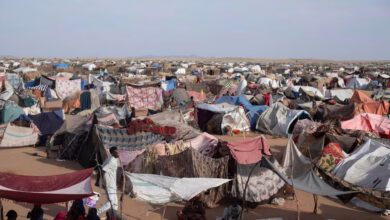The United Nations High Commissioner for Refugees (UNHCR) has closed its head office in Egypt until further notice due to ongoing protests by Sudanese refugees demanding to be resettled outside Egypt.
The protests started about three weeks ago and escalated until aggressive confrontations between refugees and UNHCR personnel forced the organization to temporarily close the office on Tuesday — a decision not to be taken lightly considering the large number of refugees yet to be registered.
Sudanese refugees assert that Egypt’s revolution has amplified the insecurity and fear of a situation already made tense by refugees' inability to obtain proper legal working status here, as well as severe racial discrimination.
The UNHCR is responsible for registering refugees in Egypt, and the Egyptian government has agreed to recognize those who have been registered. However, in practice such recognition has remained limited.
In 2005, approximately 2000 Sudanese refugees protested outside the old UNHCR office in Mohandessin, demanding relocation for similar reasons. The police raided the protest and killed at least 23 people, including children.
“We have few rights and are not welcomed into the community properly by the Egyptian government,” said Muhammed Suliman, a refugee who is championing the resettlement protest, told Al-Masry Al-Youm.
With Egypt now engulfed in a politically turbulent transitional period, many Sudanese refugees fear for their lives and are demanding that the UNHCR resettle them abroad.
“We come here [Egypt] as refugees to escape our own country,” said Suliman. “What is the point for me and my family to stay home all day afraid, never knowing what is going to come tomorrow. If we will be arrested or deported. It is not a good situation for my family to live in.”
UNHCR officials said they are unable to comment at the present time.
In related news, the UN High Commissioner for Refugees visited Egypt this week and praised Egypt’s handling of the Libyan crisis during a meeting with Prime Minister Essam Sharaf on Thursday.
Antonio Guterres said he was grateful that Egypt opened its doors to refugees fleeing the violence in neighbouring Libya.
“This is a new beginning in our relations and for refugee protection in Egypt. I hope the UNHCR will be able to enhance its assistance program, in cooperation with the Egyptian government, and increase the number of resettlement places for refugees staying in Egypt.”
Guterres asked the international community to show the same level of solidarity with Egypt as Egypt had shown to Libyans, and thanked the government for setting up refugee shelters on its border.
He said: “It is important to ensure the traumatized people who fled Libya have humane conditions at the border area until they can be evacuated or a solution found.” He said that a total of US$18 million has been spent repatriating migrant workers who had fled Libya through the Egyptian and Tunisian borders.
Guterres added that it is “essential” that humanitarian relief reaches those inside Libya — yet in a press conference after the meeting he did not say how relief can be delivered, refusing to endorse humanitarian missions supported by NATO.
He said that a UN delegation in Tripoli was working on ways to secure passage for humanitarian aid.
Guterres dismissed concerns that the crisis would leave Egypt unable to cope with large numbers of homeless Libyans, saying that of the 25,000 who arrived most will not stay and can be helped to go home.




